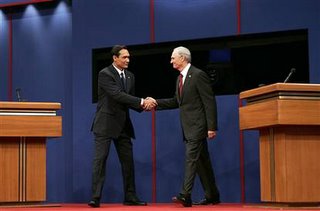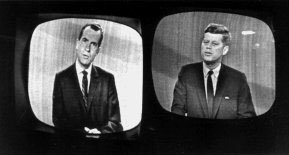That lovely sobriquet is one blogger’s name for Michael Steele, the African-American lieutenant governor of Maryland, a man seeking to become the state’s first black senator. The phrase didn’t come from what might be seen as the Usual Suspect of a white supremacist or a Web-savvy bigot on a tear. The label – and its accompanying minstrel-makeup image – was the work of a New Yorker who helms a news commentary Web site, a black member of the blogosphere with a bone to pick about a brother seen to have crossed the political tracks.
Therein lies a story of how African-American sentiment is at some pivotal intersection of race, politics and historical loyalty – a story of the ways in which black Americans are caught up in the same ugly, red state-blue state polarities as everyone else.
Steele – who plans to run in 2006 for the Senate seat that is set to open with the coming retirement of Democrat Paul Sarbanes -- has been the target of black Democrats for his presence and emerging role in the Republican party, a party seen, right or wrong, as antagonistic to black causes and aspirations.
Steele, and the GOP leadership generally, have been working to overcome the longstanding shaky courtship between blacks and Republicans. Steele has hastened to put things in a wider historical context, reminding people about the past love feast between the two in centuries past.

It's sure true enough – as the GOP has never, ever tired of letting people know – that the Republican party is “the party of Lincoln.” After the agonies of the Civil War, the presidential heirs to the Great Emancipator made black advancement more of a priority than it’s been in modern times.
After the assassination of President Lincoln, and no doubt partly as a reflexive commiseration reaction to that murder, African Americans flocked to the Republican party, which led the way to Congressional passage of the 13th Amendment to the Constitution — the one outlawing slavery. Republican efforts were also central to passage, in 1866, of a civil rights act that extended full rights to black Americans.
Progress continued in fits and starts into the twentieth century. But under President Franklin Roosevelt’s New Deal in 1936, and thoroughly in the context of “what have you done for me lately?” blacks changed course, voting overwhelmingly for FDR, in part because of government spending initiatives, like the work relief programs that benefited black Americans during the depths of the Great Depression.
Black people were beneficiaries of other Democratic policies, including President Truman's 1948 signing of Executive Order 9981, which committed the U.S. government, at long last, to integrating a long-segregated military.
Fast forward 15 years or so: Civil rights programs under President Kennedy and, more dramatically, under President Johnson (the Great Society program and his role in the passage of the 1965 Voting Rights Act) further cemented the relationship between blacks and Democrats.
But by then, the split that started between the Democrats and many of their white southern counterparts — who hated Truman's 1948 desegregation order and the Democrats' subsequent support of the civil rights movement — had widened into a figurative Grand Canyon.
The capstone of that Democrat-driven bid for progress was probably when Johnson undertook his Great Society initiative – an effort that led to the Voting Rights Act, the Civil Rights Act, and Johnson’s own prophetic suspicion that his actions on behalf of black Americans delivered the Southern states as a voting bloc into the hands of Republicans for years to come.
The Dixiecrats — those disaffected Democrats who bolted to the Republican party in 1964 — were centraal to the success of Richard Nixon's “southern strategy” in 1968, and formed the nucleus of what would ultimately become the modern GOP.
The problem many black Americans have with the GOP is largely a contemporary one, and it explains, to some extent, the allergic reaction blacks have toward the Republicans.
Let's count the ways: There's the lingering bad taste of the 2000 “hanging chad” election, and the persistent belief among many black voters that the results were somehow rigged, invalidating their votes.
Then there's Bush's nomination of Judge Charles Pickering to the Court of Appeals for the Fifth Circuit, despite Pickering's less-than-stellar record on civil rights decisions. Pickering criticized the “one-person, one-vote” principle recognized by the Supreme Court and tried to limit remedies provided by the 1965 Voting Rights Act.
Apparently indifferent to minority concerns, Bush installed Pickering on the federal bench in January 2004 as a recess appointment, bypassing the routine Senate confirmation process.
In January 2003, on what would have been Rev. Dr. Martin Luther King's 74th birthday, Bush condemned the admissions system at the University of Michigan, which used race as only one of several factors to determine qualification for admission, as “divisive, unfair and impossible to square with the Constitution.” Rep. John Conyers, leader of the Congressional Black Caucus, called the president's position “yet another slap in the face of African-American and minority leaders across the country.”
And in July 2004, in an action fraught with deep symbolism, Bush rebuffed the NAACP’s invitation to speak before its national convention, becoming the first sitting president since Warren G. Harding to refuse to address the convention. Bush chose instead to speak before the National Urban League convention – apparently oblivious to the fact that many members of the one organization also belong to the other.
The chafing was perhaps symbolized in August 2004, Nadia Naffe, a black former field director for the Republican Party, filed a federal lawsuit accusing the Florida GOP of racial discrimination, saying she was fired after complaining about being “race-matched,” or assigned to work only with black organizations.
Naffe's lawsuit alleges she was threatened by Republican Party officials and subjected to stereotypical comments by the staff.
“It seems like the Republican Party is in a continuous search for those elusive black voters,” said David A. Bositis, a senior research associate at the Joint Center for Political and Economic Studies, a think tank concentrating on African American and minority issues.
“The party of Lincoln? I don't think so,” Bositis told me in October 2004. “The Republican party is now the party of Jefferson Davis.”

All of which begins to explain the genesis of “Simple Sambo.” Such a hateful, ugly label doesn’t emerge in a vacuum. It speaks to an automatic antipathy that’s as unproductive as any directed at African Americans.
At least one black conservative said as much. “I don’t quite understand why Michael Steele has been targeted for this kind of hatred,” said Garland Williamson, president of a black business organization. “Anybody can disagree with Michael Steele or anybody else they want to disagree with, but let’s talk about the issues,” Williamson told The Associated Press in a Nov. 3 story.
But another black conservative, while not agreeing with the slander, at least appreciated its historical foundation. Ron Walters, author of a book on conservative public policy in black America, said black Republicans are often “perceived to be tools of the conservative white power structure.”
“Terms like Uncle Tom, sellout, Stepin’ Fetchit — those terms have not come from nowhere. They have a history,” Walters told the Associated Press. “It is deserved, to the degree that they support anti-racial policies.”
It hasn’t gone unnoticed by the GOP leadership and others under its banner. In October 2004, Marc Racicot, the former chairman of the Republican National Committee, told me of the GOP mission: to increase outreach to black voters. He pointed to the diversity of the Bush Cabinet.
“Have we made progress? We’ve made significant progress," Racicot said. "This president has the most diverse Cabinet in the history of America and has relied on the competence of a talented group of African Americans in that Cabinet – from [Secretary of State] Colin Powell to [HUD secretary] Alphonso Jackson to [then-National Security Adviser] Condoleezza Rice, and others.”
“Those are the kind of demonstrations that mean something to people in the African American community.”
Which begs the question, then and now, more than a year later, how such opposing philosophies can exist in one party – the diversity of the Cabinet played out against policies that call into question the value of having such a diverse group of advisers in the first place. It’s this dichotomy that confuses black voters, and suggests a fundamental insincerity that’s hard to overcome.
Armstrong Williams, the conservative black commentator, cut to the chase in January 2003: “The Republican Party has to realize that it cannot be lily-white any longer,” he said. “Change must come about, and it must start within our house.”
No question, the “Simple Sambo” slight was a nasty slap in the face of a brother hoping to advance his own political star and, by extension, elevate the electoral profile of black America in a way that breaks with the Democratic party’s longstanding reflexive assumptions of black people as being in their camp, no matter what.
But that slight didn’t come out of nowhere. It’s also a manifestation of the frustration that African Americans more broadly feel because of a party that’s seemingly complacent about addressing the needs and concerns of black Americans – concerns symbolized most recently by the piss-poor response of the federal government to the plight of mostly-black victims of Hurricane Katrina [see “American Tsunami I-V”].
Michael Steele’s upcoming campaign may well change his own political destiny, but black people are hoping to change their own destinies – to
shape their own destinies – and the GOP needs to step up to the plate and speak to their social, economic and political concerns in a way that doesn’t look like so much photo-op window dressing. Speaking to the complexities of those concerns may be the paramount challenge for the Republicans, in both the midterm elections next year and the presidential vote in 2008.
It’s as simple as that.
-----
Image credit: Steele: U.S. Navy (public domain). Bottom image from the 1899 version of the children's book 'Little Black Sambo.'

 Still, only being human, Koppel couldn't resist taking one final shot at ABC News, the network that almost kicked him to the curb not so many years ago, in the big rush to late-night, stand-up stupidity.
Still, only being human, Koppel couldn't resist taking one final shot at ABC News, the network that almost kicked him to the curb not so many years ago, in the big rush to late-night, stand-up stupidity. 











